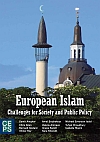Muslim Institutions and Political Mobilisation
Muslim Institutions and Political Mobilisation
Author(s): Sara Silvestri
Subject(s): Politics and religion, Sociology of Politics
Published by: CEPS Centre for European Policy Studies
Summary/Abstract: In Europe, and most of the Western world, Muslim presence in the public sphere is a recent phenomenon that characterised the last decade of the 20th century and has deeply marked the beginning of the 21st. This visible presence, which amounts to something between 15 and 20 million individuals, can best be analysed if dissected into a number of components. The first part of this chapter illustrates where, when and why organised Muslim voices and institutions have emerged in Europe, and which actors have been involved. The second part is more schematic and analytical, in that it seeks to identify from these dynamics the process through which Muslims become political actors and how they relate to other, often in competing political forces and priorities. It does so by observing the objectives and the variety of strategies that Muslims have adopted in order to articulate their concerns vis-à-vis different contexts and interlocutors. The conclusions offer an initial evaluation of the impact and of the consequences of Muslim mobilisation and institution-formation for European society and policy-making.
Book: European Islam. Challenges for Public Policy and Society
- Page Range: 169-182
- Page Count: 14
- Publication Year: 2007
- Language: English
- Content File-PDF

